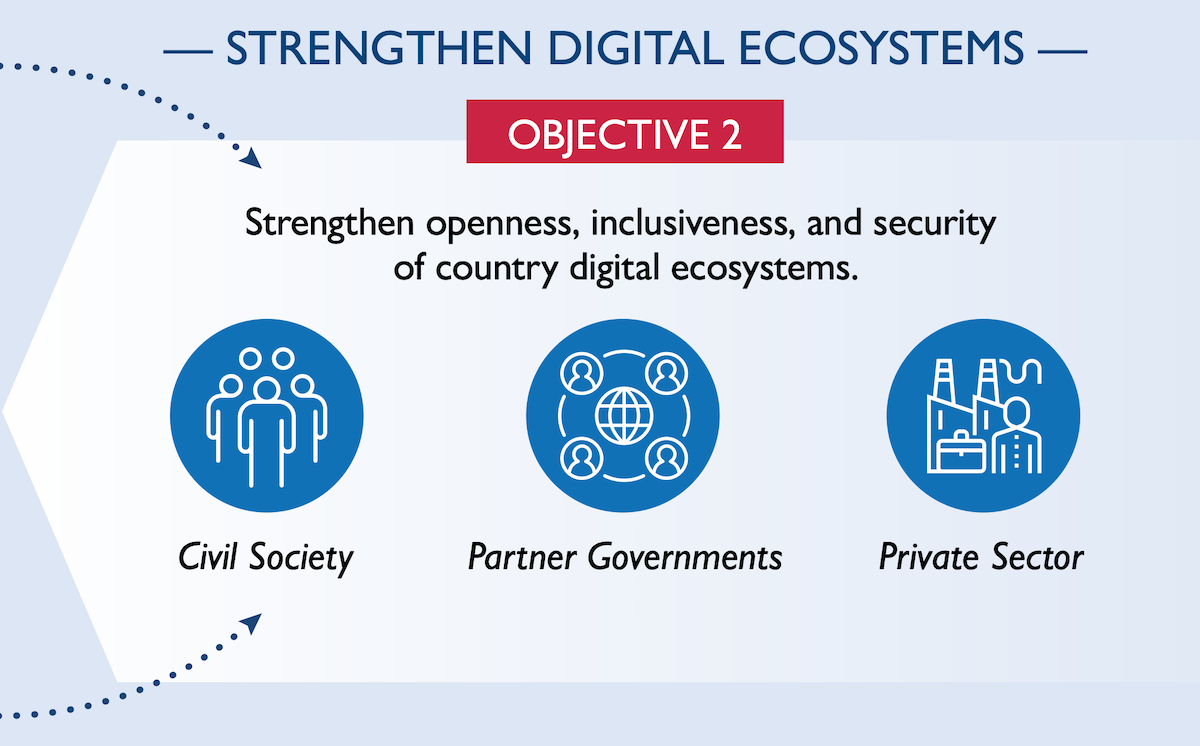Recommended
President-elect Biden has stated his intention to rebuild values-based alliances and reassert the United States’ role in promoting democracy abroad. Building on Secretary of State nominee Antony Blinken’s call for a league of democracies, the incoming Administration has committed to convene a Summit for Democracy in 2021, as part of a clear effort to counter China’s growing global influence. Limiting the spread of the digital authoritarianism model that China has pioneered at home and abroad will be key to this effort. To succeed, the US must rally like-minded liberal democracies around a set of principles for the digital age that promote shared prosperity and personal freedom. Failure to do so will allow countries like China and Russia to exert greater influence on the digital governance rules that other countries choose to follow.
China has expanded its global reach in part through its role in the global digital economy, which has grown rapidly over the last ten years. This is particularly true in Africa, where Huawei has built more than 70 percent of the continent’s 4G networks, Chinese firms produce the majority of feature phones and smartphones used, and Chinese apps are making inroads.
Under the leadership of Xi Jinping, China has promoted a vision of cyber sovereignty that challenges the idealized model of open, global internet governance by giving states greater autonomy to control and regulate the flow of data within their borders. Although the central tenet of cyber sovereignty—that countries should have the freedom to regulate the internet as they see fit—is widely held, the pairing of that principle with efforts to curtail free expression online and the use of digital tools to surveil citizens presents a threat to democracy and human rights.
In recent years, China has actively promoted norms of data governance that support state use of digital tools to conduct surveillance and stifle dissent—often referred to as digital authoritarianism. A recent report on the global expansion of AI surveillance systems asserts that Chinese firms provide AI surveillance technology to more than 60 countries and that “Chinese product pitches are often accompanied by soft loans to encourage governments to purchase their equipment” to countries that “otherwise might not access this technology” (the report also notes that democracies are increasing their use of surveillance as well, often with equipment provided by American firms). According to a Freedom House report on the rise of digital authoritarianism, the Chinese government trained officials from at least 36 countries on its digital governance model in 2018 alone.
The spread of digital authoritarianism reflects not only its natural appeal to governments that want to exert greater control over their societies but also a “widespread disillusionment with the spread of disinformation, threats to privacy, and concentration of economic and political power by big technology firms…that appear to spring from an unregulated or underregulated internet.” A comprehensive strategy to counter digital authoritarianism must therefore develop approaches to digital governance that address these concerns, including the economic growth aspirations of low- and middle-income countries. At the moment, however, “established democracies lack a consistent and collective strategic approach to combat authoritarian use of digital and online space.”
Many governments have yet to determine how they will govern different aspects of the digital world. Even among the 64 countries that enacted data protection frameworks over the last decade (most of which are modelled on the EU’s General Data Protection Framework), few have bridged the gap from law to effective implementation. In addition, most of the global debates about data policy, and cross-border data sharing in particular, have focused on rich-country priorities. There is a danger that frameworks agreed to at fora like the G7 and OECD will not serve the needs of many lower-income countries, leaving them more receptive to other governance models—as well as running the risk of creating a two-track digital global economy.
The need for greater US leadership on digital policy
As the world’s oldest democracy and home to the world’s largest technology companies, the US has both an opportunity and responsibility to provide leadership in creating governance models that support an open, inclusive, and safe digital environment. Among the world’s 70 largest digital platform firms, roughly 70 percent of the market capitalization value accrues to companies in the United States (compared to 20 percent in China, 4 percent in the EU, and less than 1 percent in Africa and Latin America). While the world benefits from the tools that US tech companies provide, the asymmetry in revenue and the consolidation of data that their business models create has led some governments to question the terms of trade offered by big tech companies. This growing sense of inequity has caused a backlash that has manifested in a range of nationalistic policies, including counterproductive data localization laws.
To date, the US has squandered its opportunity to provide leadership on digital governance, ceding ground to both China and the European Union. To provide credible leadership on digital policy, the US must first get its own house in order. Passing a comprehensive data privacy framework is a long-overdue step that would benefit US citizens by strengthening the protection of personal data and companies through streamlining compliance around a single legal framework rather than one that is fragmented across 50 states. Importantly, such a law would also benefit countries too small to influence the behavior of large US tech firms on their own and make it easier to resolve on-going debates happening at the transatlantic and global levels on cross-border data-sharing.
The US also needs to make progress in addressing the threat of misinformation on digital platforms and the risks associated with AI and facial recognition technology. Finally, it must consider steps to promote greater competition and innovation through reforms aimed at loosening the hold that a few dominant companies have over most of the world’s data. As Tom Wheeler, former Chairman of the US Federal Communication Commission (FCC), argues “Government support of competition-driven digital innovation begins with breaking the bottleneck that withholds data assets from their competitive application.”
While some of the reforms needed to deal with these challenges will inevitably constrain or raise the cost of doing business for US tech firms (and could impair the performance of the US stock market in the short term), the Biden Administration should weigh these costs against their impact on the overall health of the US economy and their geopolitical interests.
Supporting prosperous digital economies
Successful digital democracies will not only govern digital space in a manner consistent with democratic principles and human rights, they will also use data and digital tools to fuel strong and inclusive economic growth, as China has domestically. The US can amplify the beneficial impact of the domestic reforms mentioned above by using its bilateral grant-making and financing capabilities, including through a possible Digital Development Fund and its participation in multilateral development banks to more systematically invest in the enablers and safeguards that are the foundation of a digital democracy, including:
-
data governance frameworks that protect privacy and give people rights and control over their data;
-
digital infrastructure designed for the public good that maximize participation and fair use of data for innovation;
-
national statistical systems capable of using old and new types of data to inform evidence-based policymaking; and
-
active civil societies that hold governments and companies accountable and shine the light on abuses.
Finally, it’s worth emphasizing that although the need for greater US leadership is clear, the role should be taken on with a large dose of humility. In recent years, countries as varied as Estonia, India, and Singapore have spearheaded efforts to design digital governance models that create the trust and interoperability required for a robust data sharing ecosystem to fuel inclusive growth, responsive public sectors, and empower citizens. As the US moves to reassert a leadership role among free nations, the Biden Administration would be well served by acknowledging that the challenges to democracy posed by the digital age warrant collective, collaborative action.
Kay McGowan and Priya Vora co-founded Future State in 2017.
Disclaimer
CGD blog posts reflect the views of the authors, drawing on prior research and experience in their areas of expertise. CGD is a nonpartisan, independent organization and does not take institutional positions.







